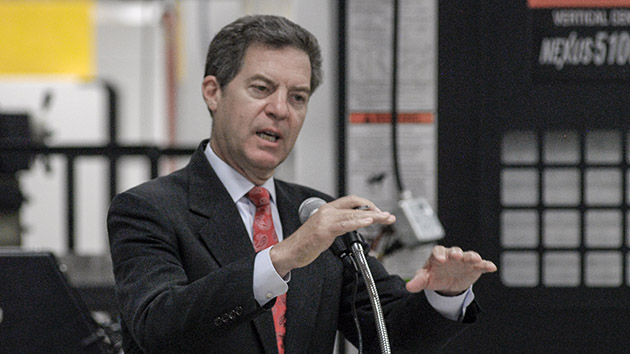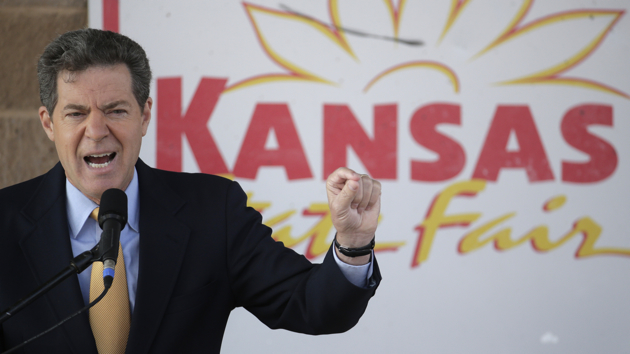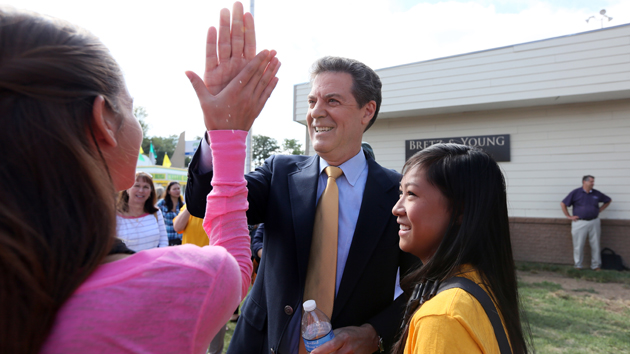
Mark Reinstein/ZUMA
Republicans have long sung the praises of trickle-down economics: Just cut taxes, and the economy will flourish as companies and individuals use the windfall to boost investment and create jobs. But a grand experiment in implementing those policies at the state level has revealed a far less rosy reality—and the consequences are threatening to spark a civil war among Republicans.
Kansas Gov. Sam Brownback, a Republican, launched an “experiment” in conservative policy after he was elected in 2010, drastically slashing the state’s income taxes under the assumption that the move would kick-start Kansas’ economy and rev up job creation. With help from Arthur Laffer, Ronald Reagan’s mastermind of trickle-down economics, Brownback convinced lawmakers in the state to cut personal income tax rates across the board and eliminate the top tax bracket, with further reductions to come. Kansas also completely erased the income tax bills for the owners of certain “small” businesses, totaling 330,000 by this year and including a host of subsidiaries of Wichita-based Koch Industries. The Koch-funded organization Americans for Prosperity helped Brownback push the bill and has remained a staunch defender of the changes. The tax cuts were sold by Brownback with the idea that they would pay for themselves when a renewed economy boosted state revenues despite the lower rates.

Four years after those tax cuts first went into effect, the opposite has occurred. The promised explosion of private-sector growth hasn’t come to pass, as the state’s economy has generally lagged the rest of the nation. In March, the Kansas Department of Labor reported, the state had only 800 more private-sector jobs than a year prior. The loss of tax revenue has decimated the state budget, creating a fiscal crisis necessitating drastic cuts, since the state, unlike the federal government, can’t run a deficit. As the Kansas City Star‘s editorial board recently highlighted, so far this fiscal year, Kansas is $420 million short of the revenue it had the year Brownback’s tax cuts first went into effect.
Now Brownback’s Republican allies who helped shepherd the tax cuts through the legislature are starting to have buyer’s remorse. “I’m not happy with how things played out,” Republican state Sen. Jim Denning told the Associated Press last month. A group of Republicans introduced a bill in March to reverse the tax exemption for small-business owners. “We are going to have long-term budget challenges unless we fix the gaping hole in our tax code, the part of our tax code that is rife with unfairness,” state Senate Vice President Jeff King, a Republican, said when the proposal was introduced.
Still, Brownback’s allies are not quite ready to ditch the experiment and raise taxes—particularly in an election year. The bill to reinstate taxes on small-business owners failed in the state House last week by a 74-45 vote.
Earlier this week, the state legislature reached a deal for a new budget to tackle the shortfalls in the current fiscal year and plan ahead for the one that starts in July, requiring $290 million in cuts or new revenue. Republicans have settled on cuts rather than higher taxes as the solution. The deal cuts highway funds by more than $100 million, delays payments to the state pension program, and reduces funding for the state university system. But legislators largely passed the buck to Brownback when it came to making some of the toughest cuts. They left an extra $92 million in the budget that needs to get erased, and the governor will have to decide what cuts to make, with social services like Medicaid a prime target. The legislature only stipulated that Brownback abstain from cutting funds for K-12 education—likely a moot point anyway, with a yearslong lawsuit still winding through the courts that could force the state to spend more money on schools.
“Those of us who come back next year better start figuring this out,” Republican state Sen. Jeff Longbine told the Topeka Capital-Journal. “And whether it’s revenue or cuts, or a combination of both—but we cannot continue to play the shell game.”














